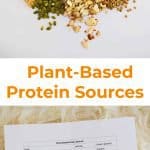 In case you missed it, we recently started a new series here on ABM called “Ask a Dietitian” where we get Sarah and Lindsey, the dietitians’ from our cookbook (Weekday Weekend) to weigh in on common questions around nutrition and diet. You can see our last article in this series (all about water) here. Today we hear from Lindsey:
In case you missed it, we recently started a new series here on ABM called “Ask a Dietitian” where we get Sarah and Lindsey, the dietitians’ from our cookbook (Weekday Weekend) to weigh in on common questions around nutrition and diet. You can see our last article in this series (all about water) here. Today we hear from Lindsey:
As Elsie + Emma’s new cookbook “drops,” the topic of plant-based protein seems particularly relevant. But let’s face it, the subject can be confusing. What does plant-based eating mean? Do plants even have protein? Will my hair fall out if I don’t eat meat? Will it fall out if I do? These are just some (not even exaggerated) examples of questions posed to me over the years as a dietitian. Hopefully, this post will help to clear the air.
For some, plant-based eating may induce visions of plates piled with nothing but broccoli and an empty pit in your stomach as you try to go sleep. But relax. Plant-based eating is so much better than that. It means not only focusing more on filling fruits and vegetables, but nuts, seeds, legumes, and whole grains. And for you carnivores out there, plant-based eating does not necessarily mean giving up meat altogether. However, if you choose to eat meat, it can mean considering it more of a side or occasional item.
Full disclosure: I do eat meat/eggs/dairy, but I don’t pass judgment on those who do or do not eat animal products of any sort. There are many valid reasons for choosing or not choosing to eat animal products. While I do choose to eat animal products, I am picky about my sources and I keep it to a minimum. I tend to eat meat at home where I am certain of the source instead of while dining out. My family is fortunate enough to be able to purchase beef and pork in bulk from a family friend and local vendor. We have a couple high quality dairy farmers in our area and backyard raised eggs from friends are in abundance.
Onward. Whether you cut out animal products altogether or are simply cutting back, getting enough protein is important. Proteins (and their building blocks, amino acids) are necessary components of so many tissues and processes in the body, they are too numerous for this post to name. Suffice it to say, they are VERY important and unlike carbohydrates and (most) fats, our bodies cannot make all the amino acids it needs. This means they must be ingested—making them essential to our diet. While most animal proteins contain all nine essential amino acids, many plant sources do not. Moreover, ounce for ounce, plants tend to contain less protein than many animal products. But have no fear, by including a variety of healthy plant sources in your diet, you can ensure you get enough protein and all the essential amino acids.
What are plant-based sources of protein?
Scope out the table below to find some yummy, yet healthy, protein-containing plant foods. I used the USDA’s National Nutrient Database and so should you! You can also download it here.
 It’s worth noting that some folks use plant-based protein powders to supplement their diet. These can easily be added to many recipes (like maybe the smoothie recipes in Weekday Weekend?). There is, no doubt, a plethora of plant-based protein powders (pea-, soy-, hemp-, rice-based, etc.) lining the shelves of your local health food store. (See Emma’s use of a vanilla mushroom protein powder here.) These certainly can be a good way to supplement, but for this post I’ll keep the focus on whole food plants.
It’s worth noting that some folks use plant-based protein powders to supplement their diet. These can easily be added to many recipes (like maybe the smoothie recipes in Weekday Weekend?). There is, no doubt, a plethora of plant-based protein powders (pea-, soy-, hemp-, rice-based, etc.) lining the shelves of your local health food store. (See Emma’s use of a vanilla mushroom protein powder here.) These certainly can be a good way to supplement, but for this post I’ll keep the focus on whole food plants.
How and how much?
Let’s first discuss the concept of complementary proteins: those foods that, when eaten together, will contain all of the essential amino acids. For you plant-only peeps, it’s important to eat a variety of plant foods to ensure you get all the essential amino acids you need. So, for your eating pleasure, I have created the list below of food combinations that, when paired, form a complete protein. Side note here: I’ve frequently run into the misconception that you must eat complementary plant proteins in the same meal. While this practice might help you to remember to eat plant-based proteins in the correct variety, the same-meal mantra is not necessary. Just shoot to eat them in the same day and you’ll be good to go.
- Beans with whole grain rice
- Peanut butter and 100% whole grain bread
- Soybeans* paired with anything (they are a complete protein)
- Hummus with 100% whole grain pita bread
- 100% whole grain noodle stir-fry with peanut or sesame seed sauce
- Lentil soup with 100% whole grain bread
- Beans or lentil tacos (on 100% whole grain tortilla)
- Quinoa with black beans
As far as how much protein is enough, the Recommended Dietary Allowance (RDA) for healthy adult women over the age of 13 years is 46 grams of protein** each day. In clinical practice, we would increase the recommended amount as body weight increases, but it’s a good starting point. To illustrate what this might look like meal-wise, I have outlined a couple of examples below. Please keep in mind that these examples are intended to give a reference for protein content only and are not intended to be a complete meal plan.
Example 1:
Breakfast- 2 tablespoons peanut butter, 2 pieces sprouted grain bread
Lunch – 1 cup beans
Dinner – 1 cup whole grain rice, 1/2 cup firm tofu*
Total: 46.5 grams of protein
Example 2:
Breakfast – 2 eggs (or ¼ cup dry textured vegetable protein), 1/2 cup quinoa
Lunch – 100% whole wheat pita bread with 3 tablespoons hummus
Dinner – 1/2 cup lentils, 2 cups spinach salad with 1 oz. pumpkin seeds
Total: 48.5 grams
I want to close by saying that for most healthy individuals, counting out grams of protein is really not necessary and can become tedious. My best recommendations are always to eat a variety of foods including whole grains and vegetables. And, if you eat eggs, dairy, meat, or fish these will add to your protein grams as well. The weekday meals from the new ABM cookbook are full of plant-based proteins and would be a great place to start (or continue) your journey.
Thanks for reading! – Lindsey
A quick note from Sarah:
If you’re trying to follow a plant-based diet while feeding a brood of kiddos, fear not. There are plenty of tasty meal and snack options to keep the whole family happy! Try homemade zucchini muffins or baked apples drizzled with almond butter and cinnamon. My crew can demolish a bowl of Emma’s black bean hummus any day of the week. For summer, our other go-to fave is frozen fruit bites. Just blend your favorite fruits (or veggies) with the yogurt of your choice (coconut yogurt is my jam), and freeze in ice cube trays for a sweet, nutritious treat. If you have a picky eater, don’t stress, as this can be very developmentally normal. When compared to adults, kids actually require more fat than protein, thanks to their big, growing brains. So dish out an extra serving of avocado and try to keep mealtimes as fun and laid-back as possible!
Q: Even though some protein is found in plants, is it really enough? I have honestly heard both sides of this many times in my life and I just don’t know what to believe. I’ve heard some say that if you want to get all your protein from plants then you will HAVE to supplement your diet. But then others will point out all the big, strong herbivore mammals out there (elephants, buffalo, etc.) as evidence that we don’t need to eat meat products. Is there an absolute truth one way or the other?
A: To put it simply, you can get enough protein from plants. However, you have to be very conscious of getting a variety of types of nutritious plant foods to get all the amino acids. Also, because plant protein foods tend to have less protein, you have to make sure to eat enough to get the grams of protein that you need (see examples above). A plant-only eater needs to be knowledgeable and diligent with this or they put themselves at risk for malnutrition. If you choose to eat eggs and dairy, this makes the need to be constantly diligent less urgent as they are high in protein and have all the essential amino acids.
The theory behind other mammals surviving on a non-diverse, plant-only diet is that their bodies produce the compounds they need that they do not get from plants. Human bodies can produce some of these compounds as well, but there are several things that we can’t produce at all (like essential amino acids) or we can’t produce them in adequate amounts. You also might have noticed that those herbivore mammals, like elephants and buffalo, spend most of their waking hours feeding in order to get all that they need. I don’t know anyone who has time for that! Humans need that variety in their food and we cook our food to help make the nutrients easier to digest/absorb.
One last thing that I feel needs to be said: If we’re talking about a strictly plant-based diet (no eggs or dairy as well as no meat/fish), there are vitamins/minerals that need to be supplemented. This is because plants either do not contain these nutrients (think vitamin B12) or do not have them in high enough amounts or in forms that are highly usable by our bodies (iron is an example here). More on the topic of vitamins/minerals might be a good topic for a future post as there is a lot more that could be discussed on that subject.
Q: Do you recommend any documentaries around the subject of plant-based diets? Seems like there is a lot to consider and I’d like to learn more.
A: My all-time favorite food-related documentary is Food, Inc. This film (and the book In Defense of Food by Michael Pollan) were a couple of the main drivers of a shift in my nutritional philosophy several years ago. While the topic of the film is not strictly about plant-based eating, the film highlights the issues that have come along with the industrial production of meat, grains, and vegetables including the effects on health and the environment. It’s so informative and you can catch it on Netflix!
 If you’d like to learn more about our cookbook, Weekday Weekend, check here.
If you’d like to learn more about our cookbook, Weekday Weekend, check here.





37 Comments
When I lived in Africa, meat was too expensive for most people and they ate mostly a red bean and maize stew. Meat was for Sundays. Having a few meat-free days each week (for those who aren’t vegetarian) is good for the budget, the waistline and the planet.
I have a recipe for savory oatmeal + whole wheat with beets (or zucchini or carrots…pick your veggie).
Thanks for sharing!
I am really enjoying this series!
So glad you are liking it!
I’ve been a vegetarian for almost 13 years and I love how I can always stumble upon a new protein source to try! It’s so easy to have a varied diet even if you don’t eat certain foods, these suggestions are great!
That’s fantastic! I’m glad it was helpful!
I’ve considered doing a day or two a week without meat but I’ve always worried about what I would eat.
Thanks for all this helpful info!
http://www.shannoninthecity.com/
There’s seriously SO many options. You should totally try it!
This is such a great and comprehensive list! I never would of imagined half the things on there had as much protein as they do!
Paige
http://thehappyflammily.com
This post is really informative. I would also love to read about the vitamins/minerals you recommend!
Thinking this will be an upcoming post. Thanks!
The incomplete protein thing was disproven decades ago! Here’s a quick summary:
http://www.jeffnovick.com/RD/Articles/Entries/2012/3/28_The_Myth_Of_Complimenting_Proteins.html
This is great. I’ve been a vegetarian for close to 12 years now. I sometimes feel like I don’t get enough protein.
http://www.slightlyluminious.com
Many years ago, an elderly lady told me that if you combine green peas and corn, you’ll have the perfect set of amino acids. Do you know whether that’s true?
And something else: when baking bread, you can start by pouring a tin or tetra box of beans or chick-peas into a blender. Blend and mix with water, oil, salt and yeast (maybe a spoonful of honey, too), then add the flour until the dough has a normal texture and continue like you usually do. This is a great way of adding more protein in your diet without even noticing!
I have not ate meat for around 16 years. I do eat eggs and diary. The past few years I have started becoming more concerned about what I am eating (after a scary illness).
One thing I have been worried about is not getting enough protein, which in turn has lead to be worrying about soy. I have tried researching it but it can get overwhelming and there seems to be sources out there that contradict each other.
Can someone off some info on soy or where to look for reliable information?
I can understand the confusion. There is contradicting information out there. I am of the opinion that organic soy products can be included in a healthy diet. They are, however, higher in omega-6 fats which we tend to get too much of in our diet, but if you’re eating them as whole foods (and not soybean oil added to foods), that is less of a concern. It’s still a good idea to get sources of omega-3 to balance them out. If you don’t feel like you can get enough protein from foods, you might try a protein powder to supplement.
I’m loving these posts. They are very informative and don’t try to guilt people to feel one way or another (which is great!). I do consume meat and dairy, but I also like to add vegetarian meals into the mix and was happy to see the list above in one of the pictures with a breakdown of grams of protein.
I’m with ya, girl! Thanks!
So timely! I was just googling for non-soy plant protein sources and took a break to read one of my fave blogs and this was one of the recent posts. Thanks for giving us informed ideas!
Thanks for reading, Kristin!
Thanks for the info! My understanding is that most Americans eat too much protein and that there is evidence that that is not healthy. You mentioned B12 but I think it bears repeating that people on veg diets should make sure they get enough B12 and Omega 3 fatty acids. And if you’re vegan you should supplement each.
Thanks, Melissa! Protein goals are tough – there’s a lot of literature out there both for and against! Certainly, the sources many Americans get it from are not the best. And, agreed; B12 and Omega-3 are concerns for plant-only folks.
love these healthy seeds mmm yummy. post/ http://www.oliviaschueller.com
Thank you so much for the info and the ideas. Hemp seeds (for my morning shakes) and pumpkin seeds (for the spinach salad) are going on my shopping list for sure. I am not normally a big meat eater and have always struggled with being conscious about getting enough protein. This totally helps. Kudos. <3
Pumpkin seeds are the best! I throw them in salads all the time!
I’m passing this on to my best friend. She’s just begun a vegetarian lifestyle and this would be perfect for her!!
Charmaine Ng | Architecture & Lifestyle Blog
http://charmainenyw.com
Great post thanks for info
Blog:http://thepinkpineappleblog.blogspot.com/
So happy you enjoyed it!
Thank you for such an informative post!
Thanks for posting! I am flextarian and agree with some of the comments that limiting meat consumption is good for your health, pocketbook & the planet. You make an important point about supplements if truly meat free. B-12 is a common deficiency if your not eating meat. And B-12 comes in vegetarian forms as well!
Agreed, Heather. And I love the “flexitarian” term!
I’ve really been loving soy milk recently. It has 8 grams of protein per cup! Since working out I’ve really ben conscious of the protein that I’m eating especially because I don’t eat meat and try not to eat eggs and dairy.
I love the taste of Edamame, and soy milk is a key ingredient in my fav smoothie, but have stayed away from soy minus predigested (Miso) as per my health consultant. He informed me that it can mimic PMS symptoms in my body and that can only be burned off through exercise. All of the other plants are wide open though and having just completed a no meat, dairy, eggs fast I cannot say enough how satisfied and great I felt during and after.
SO excited about this new feature!
Is there a printout available for that protein sources table?
Samantha – there is now a link to a printout of the table now available just above the picture! Thanks for reading!
Can’t forget nutrient dense oddballs like spirulina and nutritional yeast! Those are some of my favorites and really easy to incorporate into a lot of recipes! https://nutritionstripped.com/10-plant-based-proteins-eating/